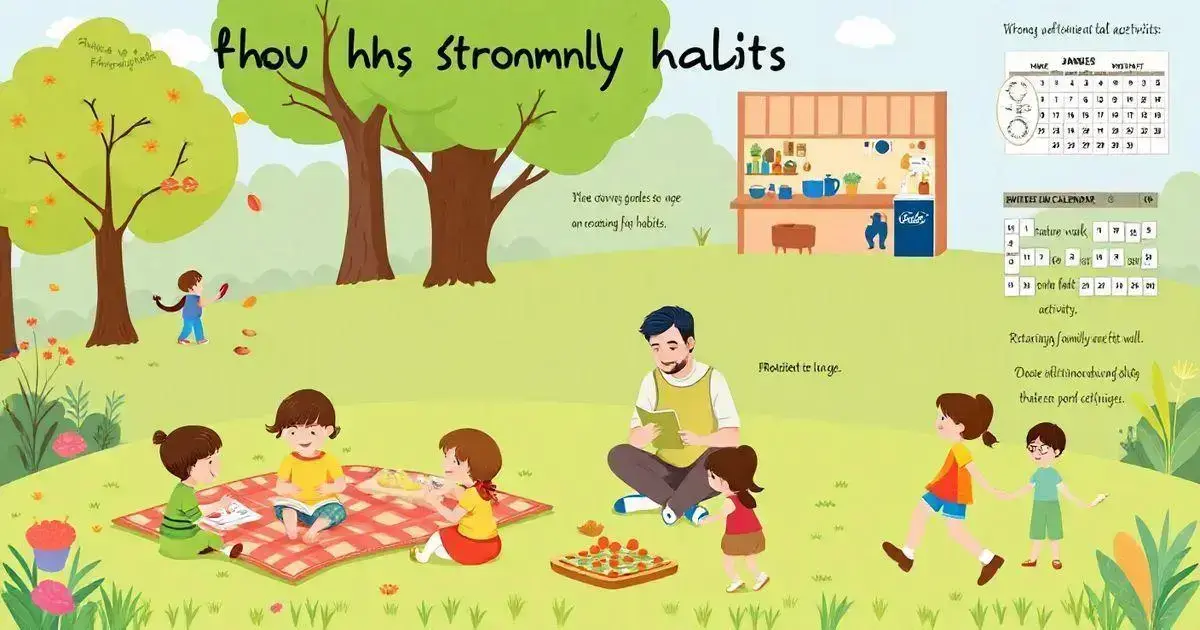Family habits are the small routines that bind families together. They create a foundation of love, trust, and emotional support. These everyday actions help strengthen the relationships that are key to a happy home.
Positive habits, like having meals together, promote communication and understanding. They create an environment where everyone feels valued and connected. This is especially important for children, as it teaches them about togetherness and respect.
However, negative family habits can have the opposite effect. They can lead to tension and misunderstandings. Want to know how to improve your family habits? Keep reading to discover simple steps to build a stronger, happier family life.
The Importance of Family Habits
The importance of family habits cannot be overstated. These are the routines and practices that bind a family together, forming the backbone of a healthy home environment. Positive family habits contribute to emotional stability and strengthen relationships among family members. Moreover, they create a sense of belonging and security that every child needs to thrive.
Establishing good habits, such as regular family meals, can foster communication and interaction. When families sit down together to eat, they have the opportunity to share their daily experiences, which enhances understanding and strengthens connections. These moments of sharing allow children to feel valued and heard.
In contrast, negative family habits can cause stress and conflict. It is essential to recognize these patterns and work towards breaking them. For example, if a family often argues during dinner, it may lead to children feeling anxious about family time. Replacing negative interactions with constructive conversations can significantly improve family dynamics.
In conclusion, the journey toward establishing beneficial family habits is ongoing. It requires dedication and effort from all family members. But with practice, these habits can lead to a more fulfilling family life, where love and support are at the forefront.
How Family Habits Affect Children

Family habits have a profound impact on children, influencing their development and outlook on life. Positive family habits, such as open communication and shared activities, foster a sense of security and belonging.
When children grow up in an environment where family members communicate openly, they learn to express their feelings and discuss problems honestly.
Moreover, regular family routines, like game nights or community volunteering, teach children about teamwork and cooperation. These shared experiences create lasting memories and instill values that children carry into adulthood.
On the opposite end, negative family habits can lead to adverse effects. For instance, a home environment filled with conflict or neglect may lead to anxiety and behavioral issues in children. Recognizing the influence of family habits is crucial for parents to create a nurturing atmosphere where children can thrive.
In conclusion, by focusing on building positive family habits, parents can significantly promote their children’s emotional and social development, setting them up for success in their future.
Creating Positive Family Habits
Creating positive family habits is essential for a healthy family life. These habits can include regular family dinners, where all members sit together to share their day. This practice not only encourages communication but also strengthens bonds.
Another important habit is setting aside time for family activities, such as game nights or outdoor adventures. These moments allow families to connect and nurture their relationships.
Establishing routines, like bedtime stories, can enhance children’s love for reading and foster intimacy. Likewise, participating in community service as a family can teach children valuable lessons about compassion and responsibility.
It is important to recognize that breaking negative patterns is also part of creating positive family habits. Families should work together to identify habits that do not contribute to their well-being and replace them with healthier alternatives. By focusing on the positive, families can cultivate a supportive atmosphere that encourages growth and happiness.
Breaking Negative Family Patterns

Breaking negative family patterns is crucial for creating a healthy environment. Families often develop habits that can lead to conflict and misunderstanding. One common negative pattern is communication breakdown.
When family members do not openly discuss feelings, it can create distance and resentment. To improve communication, families can set aside regular family meetings to address issues in a supportive setting.
Another pattern to address is inconsistent discipline among parents. Children thrive on structure and clear expectations, so it’s important for parents to align their approaches to discipline. This alignment can foster a sense of stability and trust in children.
Additionally, it’s essential to identify behaviors that may lead to negative interactions, such as blaming or criticizing instead of problem-solving together.
Encouraging a culture of positivity, where family members support one another, is vital in breaking these harmful patterns.
Engaging in family therapy or counseling can also provide valuable tools to help families confront negative dynamics.
With commitment and effort, families can replace harmful habits with practices that build connection and understanding.
Family Habits for Better Communication
Family habits play a critical role in enhancing communication within the household. Establishing a routine for family discussions allows everyone to express feelings and share experiences.
One effective habit is having a weekly family meeting where members can talk about their week, discuss any issues, and celebrate achievements. This practice encourages open dialogue and ensures everyone feels heard.
Another valuable habit is active listening. When family members practice listening to each other without interrupting, it strengthens mutual respect. Children learn to value the opinions of others, fostering empathy and understanding.
It is also essential to model positive communication through non-verbal cues. This includes maintaining eye contact and using encouraging gestures. Being mindful of tone and body language can greatly impact the effectiveness of communication.
In addition, families can benefit from engaging in fun activities together, such as cooking or playing games. These shared experiences not only create positive memories but also provide natural opportunities for conversation and bonding.
By making communication a priority, families can build stronger relationships and a harmonious home environment.
Fun Activities to Build Family Habits

Fun activities are key to building positive family habits. Engaging in these activities together can strengthen bonds and create lasting memories. One great way to do this is by organizing family game nights. Choose a variety of board games or card games that everyone enjoys. This can lead to laughter, friendly competition, and conversations that bring family members closer together.
Another idea is to plan outdoor adventures, such as hiking, biking, or visiting local parks. These activities not only promote a healthy lifestyle but also allow families to explore nature together. Parents can use these moments to teach children about the environment, creating an educational aspect to the fun.
Cooking together can also be a delightful activity. Involving children in meal preparation teaches them valuable skills and encourages creativity. You can try new recipes as a family and make cooking an enjoyable experience that everyone looks forward to.
Creating family traditions around holidays or special occasions can further enhance these habits. Whether it’s decorating for the holidays or engaging in volunteer work, these traditions foster a sense of togetherness and belonging. Such experiences contribute to a loving family atmosphere that everyone cherishes.
Long-Term Benefits of Strong Family Habits
Strong family habits offer numerous long-term benefits that positively impact all family members. By cultivating habits such as regular family gatherings, families can strengthen their bonds and create a sense of belonging.
These gatherings often foster open communication, allowing family members to discuss their feelings and share important life updates.
Additionally, when families engage in consistent routines, like shared meals or game nights, they encourage a feeling of security for children. This stability helps kids develop social skills and emotional intelligence. Over time, these skills can significantly enhance their relationships outside the family unit.
Another key benefit of strong family habits is that they instill values and traditions in children. Simple practices, such as celebrating birthdays or holidays together, teach kids the value of togetherness and respect for family history. These traditions often become cherished memories that children carry into their own families.
Moreover, strong family habits support mental health. Families who communicate and interact regularly tend to foster emotional resilience. This resilience helps members navigate life’s challenges more effectively and promotes a positive outlook on life.
FAQ – Frequently Asked Questions about Family Habits
What are family habits?
Family habits are routines and practices that families engage in regularly to foster connection and communication.
Why are family habits important?
They promote emotional well-being, help in the development of social skills, and create lasting bonds between family members.
How can we create positive family habits?
Engage in activities together, maintain open communication, and establish regular family traditions to nurture relationships.
What are some examples of positive family activities?
Family game nights, cooking together, and outdoor adventures are great ways to build positive habits.
How do negative family habits affect children?
Negative habits can lead to issues such as anxiety, communication breakdown, and strained relationships.
Can family habits improve mental health?
Yes, strong family connections and positive interactions contribute to better emotional resilience and overall mental health.